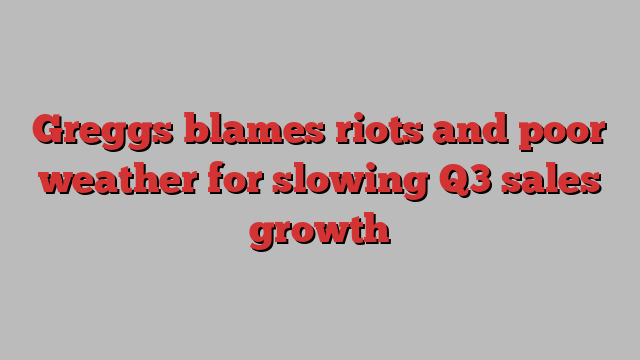
Unlock the Editor’s Digest for free
Roula Khalaf, Editor of the FT, selects her favourite stories in this weekly newsletter.
Greggs shrugged off slowing sales in the past quarter, which the UK bakery chain blamed on violent riots and poor weather, and said its appeal to cost-conscious shoppers would endure even as inflation eased.
However, shares in the food-to-go retailer — which continues to expand rapidly as its popularity has soared in recent years — still fell 6 per cent on Tuesday as sales growth slowed in the three months to September 28.
“We had the riots, and we know that in some key shopping locations the public decided to stay away from those locations for a period of time just because of the unrest that was taking place,” chief executive Roisin Currie told the Financial Times. The UK experienced about a week of anti-immigrant and far-right violence from late July, as masked men attacked hotels housing asylum seekers and mosques while clashing with police.
She added that the “wet and damp weather of the British summer” as well as uncertainty over the general election had weighed on trading in July and August, but that it had recovered in September.
Like-for-like sales for company-managed shops were up 5 per cent in the 13-week period, a slowdown from a 7.4 per cent rise in the first half.
Currie said she was confident that 2025 would be “better than the preceding two years” for Greggs, which grew significantly amid the cost of living crisis, as consumers will stick with its products such as the popular sausage rolls even when they have more disposable income.
“Customers, through the cost of living crisis, have now just become more savvy,” she said. “Even when you might have a bit more cash in your pocket, you want to choose where you spend that.”
“We’ve probably got more customers who maybe came to us occasionally previously, but are 1727798732 more frequent consumers, and I believe that behaviour will stay,” Currie said, adding that new products and opening into the evening were broadening the chain’s appeal.
She added that the easing of inflation including food commodities would also relieve cost pressure on the business, even as wage costs continued to grow.
Data published by the British Retail Consortium said UK shop prices fell for the second consecutive month in September, with the 0.6 per cent contraction the lowest rate in more than three years.
Currie’s bullish comments come as Greggs gears up its expansion. The Newcastle-based group is set to open between 140 and 160 new stores this year, after adding 145 in 2023.
In 2021, Greggs set out a plan to double its sales by 2026 and to have “significantly” more than 3,000 shops in the UK. It currently has 2,559.
Shares have surged over the past year, rising 28 per cent before Tuesday’s fall. Clive Black, head of research at Shore Capital, said the third quarter was “weaker and also more volatile than the management would have expected”.
“Greggs is undoubtedly very well placed when times get tough”, which has been the case over the past few years, Black said. “As inflation falls and living standards rise, is Greggs as well positioned as some others? Probably not.”

